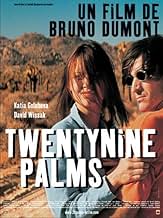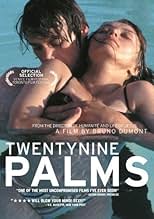IMDb रेटिंग
5.1/10
5.3 हज़ार
आपकी रेटिंग
अपनी भाषा में प्लॉट जोड़ेंDavid, an American photographer, and his Russian girlfriend Katia are scouting locations for a photo shoot. During the day, they drive through some of the wildest, most bizarre desert landsc... सभी पढ़ेंDavid, an American photographer, and his Russian girlfriend Katia are scouting locations for a photo shoot. During the day, they drive through some of the wildest, most bizarre desert landscapes, but their luck begins to run out.David, an American photographer, and his Russian girlfriend Katia are scouting locations for a photo shoot. During the day, they drive through some of the wildest, most bizarre desert landscapes, but their luck begins to run out.
- निर्देशक
- लेखक
- स्टार
- पुरस्कार
- 1 जीत और कुल 2 नामांकन
Yekaterina Golubeva
- Katia
- (as Katia Golubeva)
फ़ीचर्ड समीक्षाएं
Well this one definitely isn't for everyone, as you can tell by the comments. For awhile, I liked this movie. I kind of liked these two driving around in the desert. The movie had that sort of dreamlike Zabriskie Point thing going on. In fact, along those lines, I'd mention that the film did feel like something from the 1960s (in a good way).
Katia Golubeva is a pretty enough girl, and we see a lot of her.
I know from regular trips to Death Valley that Europeans have a special respect for American deserts. At Badwater Junction in Death Valley, you can walk out onto the salty flats and despite the fact that you're in a giant valley, they know enough to whisper, or remain silent altogether. It's a pensive respect for the desert I wish more Americans had.
Here, you get a lot of California desert; always a good thing (to me). I liked these two characters when they were getting along - there was a weird and charming sort of innocence in their sex life and affection for each other.
Didn't fully get why they were constantly sniping at one another or why they kept having falling outs with each other. And that seems to be important to the overall point of the film, and I'm still thinking about it. I wanted to slap them - especially David - when he was being a jerk.
Because you should *never* take a sexually liberated French girl naked in the desert for granted that way (Am I right?).
The end is jarring, and a metaphor for something but I'm not sure what, exactly. Something, I suspect, about the fact that the two characters should have been a little more tender and appreciated each other more (especially on the dude's part), what with all the meanness and cruelty in the world (and so on).
This is not for everyone. It is slow moving, beautiful to look at, with characters who occasionally charm and occasionally irritate. The end sequence is disturbing and unpleasant.
If you're a fan of mainstream Hollywood, you might find this excruciatingly boring. The pervasive quiet of the movie makes the end all the more startling.
This film was not an unqualified success, but there's a fair amount to like here, I think. For certain people, anyway.
Katia Golubeva is a pretty enough girl, and we see a lot of her.
I know from regular trips to Death Valley that Europeans have a special respect for American deserts. At Badwater Junction in Death Valley, you can walk out onto the salty flats and despite the fact that you're in a giant valley, they know enough to whisper, or remain silent altogether. It's a pensive respect for the desert I wish more Americans had.
Here, you get a lot of California desert; always a good thing (to me). I liked these two characters when they were getting along - there was a weird and charming sort of innocence in their sex life and affection for each other.
Didn't fully get why they were constantly sniping at one another or why they kept having falling outs with each other. And that seems to be important to the overall point of the film, and I'm still thinking about it. I wanted to slap them - especially David - when he was being a jerk.
Because you should *never* take a sexually liberated French girl naked in the desert for granted that way (Am I right?).
The end is jarring, and a metaphor for something but I'm not sure what, exactly. Something, I suspect, about the fact that the two characters should have been a little more tender and appreciated each other more (especially on the dude's part), what with all the meanness and cruelty in the world (and so on).
This is not for everyone. It is slow moving, beautiful to look at, with characters who occasionally charm and occasionally irritate. The end sequence is disturbing and unpleasant.
If you're a fan of mainstream Hollywood, you might find this excruciatingly boring. The pervasive quiet of the movie makes the end all the more startling.
This film was not an unqualified success, but there's a fair amount to like here, I think. For certain people, anyway.
This is one of those films where "nothing happens", where the frame stands as a window into the world of tedium. It's contrasted against this humming nothingness, mirrored in the film in the empty stretches of desert, that the small gestures can reverberate outwards to the eternal, to give us a portrait of life as we might know it by our own existence, elsewhere, in some other time.
These fleeting human moments, painful or exhilarating in their small profundity, largely make the film for me. A man stealing a glance at a passing girl in a diner, glance which may or may not be casual or mean something else, and which makes the woman sulk in jealous consternation. The woman trying to penetrate the hard, unyielding, demeanor of the man, asking him as he drives what is he thinking, the man saying nothing. The irritable tantrum of the man when their car won't go any further in a dirt road, that reveals the male child inside, petulant and impotent at the sight of failure.
Elsewhere Dumont fails to cut as incisively. The contrast he gives us in the first pool scene, "do you love me?", "do you like my penis?", is simpleminded at best.
The film works despite all that, first as a tangible reminder of the meaninglessnes of craving, here in the form of carnal animal sex that needs to be consumated, almost exorcised, the moment it builds. The nothingness of Dumont's desert world is not the shunyata of the Buddhists though, a realization of the world in true form. Rather it's a limbo where souls in disconnect aimlessly drag their feet yearning for a sense of direction or purpose when the only sense possible is a sense of still time. This shines for me in the latenight scene where David finds Katia sitting by herself at the side of the macadam, they seem like they're washed ashore in some other plain of existence. A pall of simmering, unspeakable, violence hangs over this like the shifting rents of dust in a dirt road, so that at least a breaking point can be surmised to be waiting at the other end.
Then it works for me as a painful vehicle that brings us at the brink of the existential void. I'm not very enamored of the act of random cruelty that makes this possible, the randomness makes sense yet at the same time it's so easy as to be schematic, but the monster that emerges on the other end is a shocking sight to me because I have the memory of the flawed human being that used to be.
The dysfunction of the protagonists then, foremostly human, also foreshadows doom. That malaise we see but small traces of in their behavior must exist out there too, in the rest of the world that is largely kept from our eyes.
Dumont doesn't dare go any further than this, that is if we accept there is somewhere to go, but as an agnostic lament it goes far enough.
These fleeting human moments, painful or exhilarating in their small profundity, largely make the film for me. A man stealing a glance at a passing girl in a diner, glance which may or may not be casual or mean something else, and which makes the woman sulk in jealous consternation. The woman trying to penetrate the hard, unyielding, demeanor of the man, asking him as he drives what is he thinking, the man saying nothing. The irritable tantrum of the man when their car won't go any further in a dirt road, that reveals the male child inside, petulant and impotent at the sight of failure.
Elsewhere Dumont fails to cut as incisively. The contrast he gives us in the first pool scene, "do you love me?", "do you like my penis?", is simpleminded at best.
The film works despite all that, first as a tangible reminder of the meaninglessnes of craving, here in the form of carnal animal sex that needs to be consumated, almost exorcised, the moment it builds. The nothingness of Dumont's desert world is not the shunyata of the Buddhists though, a realization of the world in true form. Rather it's a limbo where souls in disconnect aimlessly drag their feet yearning for a sense of direction or purpose when the only sense possible is a sense of still time. This shines for me in the latenight scene where David finds Katia sitting by herself at the side of the macadam, they seem like they're washed ashore in some other plain of existence. A pall of simmering, unspeakable, violence hangs over this like the shifting rents of dust in a dirt road, so that at least a breaking point can be surmised to be waiting at the other end.
Then it works for me as a painful vehicle that brings us at the brink of the existential void. I'm not very enamored of the act of random cruelty that makes this possible, the randomness makes sense yet at the same time it's so easy as to be schematic, but the monster that emerges on the other end is a shocking sight to me because I have the memory of the flawed human being that used to be.
The dysfunction of the protagonists then, foremostly human, also foreshadows doom. That malaise we see but small traces of in their behavior must exist out there too, in the rest of the world that is largely kept from our eyes.
Dumont doesn't dare go any further than this, that is if we accept there is somewhere to go, but as an agnostic lament it goes far enough.
Just don't focus on this stuff people say that nothing happens for hours and that at the end there 'finally' is some violence. It's not true. A lot of things happen. And if nothing happens then you're just watching a wonderful shot.
Just don't focus all the time about what's coming next and what this and that could mean while watching a movie. Just relax and watch the movie. Lean back. It's about a couple. They're driving around in the desert (he's doing some location scouting for a photography job). They love, they hate, they fear each other. Sometimes they don't understand each other but everything seems to go along. They're driving along in this vast free desert. Alone it seems.
And did I mention you should relax when watching a movie? You can't talk to a screen, so why blame the movie?
Just don't focus all the time about what's coming next and what this and that could mean while watching a movie. Just relax and watch the movie. Lean back. It's about a couple. They're driving around in the desert (he's doing some location scouting for a photography job). They love, they hate, they fear each other. Sometimes they don't understand each other but everything seems to go along. They're driving along in this vast free desert. Alone it seems.
And did I mention you should relax when watching a movie? You can't talk to a screen, so why blame the movie?
While working in the California desert, French auteur Bruno Dumont (Flanders, Humanite, The Life Of Jesus) "suddenly became afraid." Thus blossomed Twentynine Palms, a mesmerizing, allegorical, terrifyingly unclassifiable foray into the Mojave and the problematic center of Yeats' The Second Coming.
Ostensibly, Palms is the story of an American photographer, David (David Wissak) and his European girlfriend, Katia (Yekaterina Golubeva of Leos Carax's Pola X) on assignment in the Joshua Tree desert. Hobbled by a Babelish communication barrier, their interaction limited to sex, and a mutual, rapidly disintegrating co-dependence, the couple is moving deeper into no-man's land on some kind of aimless and encroachingly sinister vision quest.
An exquisite road picture interspersed with long pockets of drifting, expansive dreaminess, Palms has moments of serenity and meditative calm. But make no mistake: it's moving closer to something awful in every frame, its sense of what's approaching disarmed rather than exacerbated by the landscape the opposite strategy of pictures like Peter Weir's Picnic At Hanging Rock, another brilliant nature film in which the natural world becomes oppressive and claustrophobic despite the freedom of sky and open spaces. The film benefits enormously from the perfect physical appearance of its leads: Wissak has alarming eyes and a face that seems to have disaster imprinted into it...one of the most brilliant achievements of the film is the way the faces of both leads keep fluctuating from dead to alive, without any noticeable outward changes in makeup or lighting.
The concept of Palms as a love story, as some have called it, falls hard. The film is loaded with sex intense, wailing, despairing sex that foreshadows in every way the horror that is to come at movie's end, though exactly what kind of a statement Dumont was trying to make with this remains unclear; one is inevitably moved to question his motives in the same way many questioned Gaspar Noe's in Irreversible (a film to which Palms has been infrequently compared). But Dumont's superb sense of artistry and restraint has noting is common with Noe's adolescent appropriation of philosophies too sophisticated for him and his fascination with cruelty and sadism cloaked in frantic & flashy concept art. Instead, Twentynine Palms presents us with the problem of evil accompanied by a sense of profound and deep sorrow, a mourning for a fate that may or may not be implied as inexorable, playing out under the unchanging beauty of land and sky.
Ostensibly, Palms is the story of an American photographer, David (David Wissak) and his European girlfriend, Katia (Yekaterina Golubeva of Leos Carax's Pola X) on assignment in the Joshua Tree desert. Hobbled by a Babelish communication barrier, their interaction limited to sex, and a mutual, rapidly disintegrating co-dependence, the couple is moving deeper into no-man's land on some kind of aimless and encroachingly sinister vision quest.
An exquisite road picture interspersed with long pockets of drifting, expansive dreaminess, Palms has moments of serenity and meditative calm. But make no mistake: it's moving closer to something awful in every frame, its sense of what's approaching disarmed rather than exacerbated by the landscape the opposite strategy of pictures like Peter Weir's Picnic At Hanging Rock, another brilliant nature film in which the natural world becomes oppressive and claustrophobic despite the freedom of sky and open spaces. The film benefits enormously from the perfect physical appearance of its leads: Wissak has alarming eyes and a face that seems to have disaster imprinted into it...one of the most brilliant achievements of the film is the way the faces of both leads keep fluctuating from dead to alive, without any noticeable outward changes in makeup or lighting.
The concept of Palms as a love story, as some have called it, falls hard. The film is loaded with sex intense, wailing, despairing sex that foreshadows in every way the horror that is to come at movie's end, though exactly what kind of a statement Dumont was trying to make with this remains unclear; one is inevitably moved to question his motives in the same way many questioned Gaspar Noe's in Irreversible (a film to which Palms has been infrequently compared). But Dumont's superb sense of artistry and restraint has noting is common with Noe's adolescent appropriation of philosophies too sophisticated for him and his fascination with cruelty and sadism cloaked in frantic & flashy concept art. Instead, Twentynine Palms presents us with the problem of evil accompanied by a sense of profound and deep sorrow, a mourning for a fate that may or may not be implied as inexorable, playing out under the unchanging beauty of land and sky.
i can easily understand why this film has been so hated, but i must say that it is at times one of the most beautiful, and at others, one of the most disturbing films i've ever seen. after seeing humanite, i walked in to the theatre with very low expectations (i'm not a dumont fan in the least), but something in the stark beauty of the photography sucked me in, i found the numb vacant space of the characters, and hook, line and sinker, fell right into dumont's trap. i doubt i would recommend this film to anyone but my closest (and most tolerant) friends, but have to say that i loved it, and thing it may also be found rewarding by other patient and adventurous viewers.
क्या आपको पता है
- ट्रिवियाCasting Director Elisabeth Jereski originally planned to cast Marine Corporal Joshua James in the lead, but was rebuffed by his local Squadron Commander, Lt. Col. F.J. Usry, as the graphic sex scenes and violence would portray the Marine Corps, with which James was actively serving in 29 Palms, in a "less than positive light in the community."
- कनेक्शनFeatured in Kinomagazin: Das Schöne ist mein Dämon - Der Filmemacher Bruno Dumont (2007)
- साउंडट्रैकAkata Sun Dunchi
Performed by Takashi Hirayasu and Bob Brozman
Written by Takashi Hirayasu
Instrumental arrangements by Takashi Hirayasu and Bob Brozman
Published worldwide by Riverboat (UK) Music
Under license from World Music Network
टॉप पसंद
रेटिंग देने के लिए साइन-इन करें और वैयक्तिकृत सुझावों के लिए वॉचलिस्ट करें
- How long is Twentynine Palms?Alexa द्वारा संचालित
विवरण
- रिलीज़ की तारीख़
- कंट्री ऑफ़ ओरिजिन
- आधिकारिक साइटें
- भाषाएं
- इस रूप में भी जाना जाता है
- 29 palmas - Pasiones salvajes
- फ़िल्माने की जगहें
- उत्पादन कंपनियां
- IMDbPro पर और कंपनी क्रेडिट देखें
बॉक्स ऑफ़िस
- US और कनाडा में सकल
- $54,523
- US और कनाडा में पहले सप्ताह में कुल कमाई
- $12,870
- 11 अप्रैल 2004
- दुनिया भर में सकल
- $1,67,999
इस पेज में योगदान दें
किसी बदलाव का सुझाव दें या अनुपलब्ध कॉन्टेंट जोड़ें






















